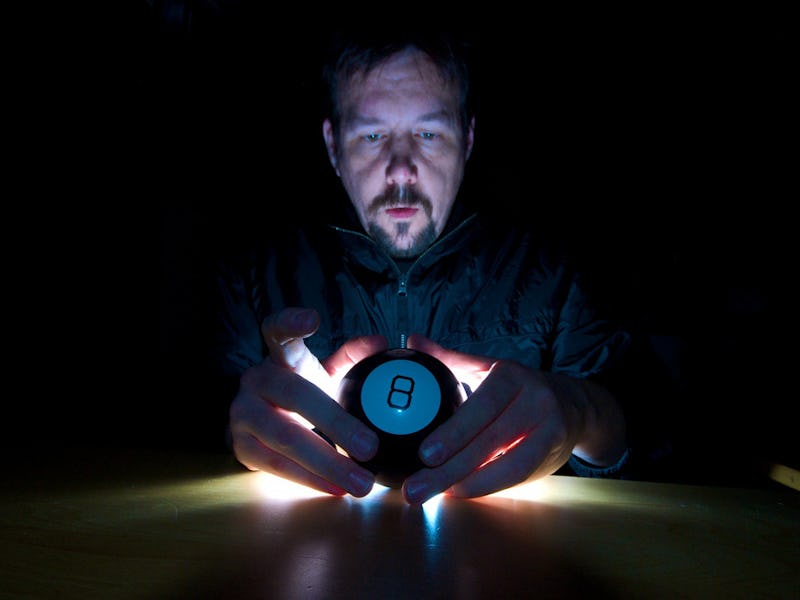Future Elections Will Probably Not Be About the Issues
Chuck Klosterman explains why we didn't see this coming.

Waves of shock are rolling through the United States today, as many can’t reconcile the reality of President-Elect Donald Trump’s victory with poll-driven expectations. And the surprise is not exclusive to the political left; many conservatives and even Trump insiders have been publicly dumbstruck. As pundits and political analysts scramble to devise out-of-the-box and radical new approaches to predicting future elections, Chuck Klosterman’s recent book But What If We’re Wrong?: Thinking About the Present as Though It Were the Past is sidling toward the front of book shops. His counterintuitive future-prediction theories seem to contain an emergent truth: the issues don’t matter.
In his book Chuck Klosterman introduced “Klosterman’s Razor,” an intellectual concept that dictates that “the best hypothesis is the one that reflexively accepts its potential wrongness to begin with.” What this means is that your glass-half empty or full thinking isn’t relevant. The issue is the nature of the glass itself.
“In my view, this outcome illustrates two significant things,” Klosterman explained via email Wednesday morning. “The first is that technology has made accurate polling impossible, which was also the case with Brexit. No one will ever believe polls again. And the second thing is that people evidently hate the media more than than they hate anything else. When major media institutions started openly attacking Trump — which they justifiably believed was their civic responsibility — it had the opposite impact. It pushed people toward Trump, because consumers became convinced that the media was actively telling them what to think and feel. It validated the sense of paranoia.”
For some voters, it didn’t matter what Trump’s stand on the “issues” really was, but instead, an almost impossible task of locating authenticity in political discourse. In this way, if you expected Hillary to win, then imaging a Trump voter is akin to a fan of the Michael Bay Transformers movies. Not one self-respecting critic says anything positive about these films, and yet, they are hugely popular and financially widely successful. Fans of the Transformers movies exist, and the ridiculous sequels continue to be greenlit. The popularity of the band Nickelback is another example. The fans/supporters seem to be invisible, but that’s because there’s no such thing as universal understanding of a zeitgeist; in entertainment or politics.
“There are just these emerging psychological gaps within society that make predicting national elections borderline impossible,” Klosterman explained. “As it turns out, a huge swath of the country including, apparently, — 42 percent of female voters — did not particularly care that Trump said offensive, problematic things about women. That played zero role in who they voted for. Yet, to another sector of the country, it was assumed that those same statements were critical, and that they would ultimately destroy him, and that someone who talked like that could never possibly be elected president.”
Donald Trump convinced enough people that he had done enough in his life to be elected president, and the medium by which he got that message out, probably relied more on a game of telephone than it did on “established” media promotion. We could think of this as a bizzaro grassroots campaign, but, as the premise of Kloterman’s book asserts: We live in an age of casual “certitude.” And rejecting that casual certitude is critical to making more accurate predictions. In other words, we don’t know what is and is not grassroots anymore.
“What appears to be happening is that it’s no longer two candidates disagreeing over different ways to solve the economy or exhibiting different postures about foreign policy,” Klosterman explains. “It’s that the issues one side views as essential are completely irrelevant to the opposition. There’s no connecting fluid at all. There is virtually no monoculture. Everything is niche politics now, and the size and intensity of those fragmented niches will dictate who wins elections.”
There isn’t just one medium-full glass; there are many. And they’re all custom made for different drinkers. At the moment, there doesn’t seem to be a pattern to this, but in an age of upended assumptions uncertain has become a lone constant. The issues you think matter likely don’t. The potential wrongness you see in the world is a source of truth. Klosterman’s Razor cuts both ways.